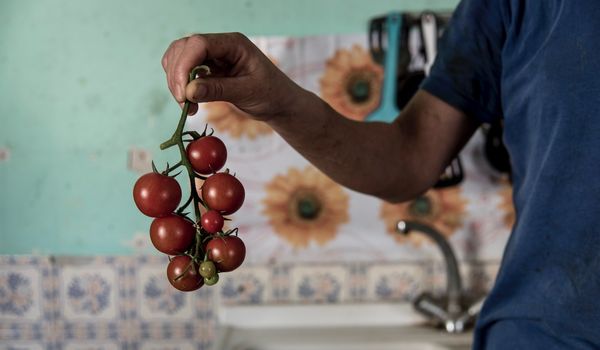Women working without protective gear in Spanish strawberry fields, Moroccan seasonal laborers trapped without water or electricity in crowded shelters, undocumented workers living in camps without access to washing facilities or health care - the Corona pandemic has worsened the working conditions of thousands of agricultural workers all over Europe.
Widespread border closures in an attempt to contain the virus cut off the constant stream of seasonal workers, European vegetable and fruit production so heavily relies on. With borders locked down, farmers and authorities scrambled to find labor. During the state of emergency in March, the Spanish government declared agricultural workers “essential”, in April Germany and England flew in Romanian workers on charter flights to harvest asparagus and other vegetables.
But although Corona revealed the dependence of most European food production on seasonal and migrant workers, their working conditions - already dire before - only worsened. Women, who make up large shares of the workforce, are particularly affected.
Not a labour shortage, but a shortage of rights for workers
In the Italian region of Apulia, Basilicata and Calabria, in the so-called area of “Arco Ionico”, where there are around 42,600 companies in the agri-food sector, 22,702 women used to work in the fields. 5,901 were migrants, most of them from Romania and Bulgaria. A survey from the Italian Ministry of Agriculture, CREA (Council for Agricultural Research and Economics) and the NGO Action Aid, revealed that during the lockdown, women foreign laborers were even more in a condition of weakness, vulnerability and precariousness, also due to family and social difficulties, and that they were exposed to blackmail of a job application on the verge of fairness and lawfulness. They became victims of forced labor and labor exploitation.
Italy was the first EU member state to declare a state of emergency closing its borders on 31 January 2020. National farmers’ organizations such as Coldiretti declared that these measures caused a labor shortage because Eastern European workers (mainly Romanians, Poles and Bulgarians) were not allowed to travel to the country. Farmers unions have estimated a shortfall of about 370,000 seasonal workers.
According to Alessandra Corrado, Associate Professor at the Department of Political and Social Sciences at the University of Calabria and Letizia Palumbo, research fellow at the Migration Policy Centre at the European University Institute in Florence, the pandemic “highlighted the dependence of the agri-food sector on cheap and flexible migrant labour, one of the results of power imbalances in long supply chains. However, in many areas this labour shortage was largely fictitious”. Instead, Corrado and Palumbo write: “There is not a labour shortage, but a shortage of rights for workers”. As reported by the two scholars: “In some areas, the labour shortage of Eastern European workers has therefore been offset by a reserve army of irregular migrant labour. In fact, a lack of labour inspectorate controls in the fields during the pandemic has contributed to an increase in recourse to irregular workers”.
In fact, for these regions and according to the survey by CREA, part of the Romanian workers went back to their country and they are unlikely to return in the short term. The reason is that Italy is considered a high COVID-19 risk area. Therefore, a return would entail a quarantine period, with all the problems related to domiciliation and the inability to work.
The situation is different in Vittoria, Sicily, one of the main areas for cherry tomato production in Italy. Up to 5,000 Romanian women still work there as tomato pickers. “Here there was not a labor shortage and workers continued to go to work in the greenhouses. Most of the migrant workers from Romania and Tunisia live here throughout the year”, Giuseppe Scifo, Secretary of CGIL, Italy's largest union, said. Problems that were reported years ago, remain in place. Tomato pickers live in storehouses and shacks in the middle of the fields. Even if women work twelve hours a day, they earn as little as 25 to 30 euros. They are paid less than their male counterparts for the same tasks working in the same fields. Additionally, they face discrimination and sexual harassment.

